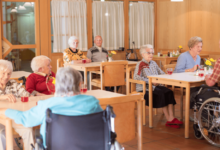Study finds three-quarters of nurses burned out after Covid

Three-quarters of frontline nurses in China were left burned out after the Covid-19 pandemic, a new study has suggested.
The study, published in BMC Public Health, surveyed nurses from 27 Chinese provinces between April and July 2023, asking them to self-score on markers of burnout such as emotional exhaustion, depersonalisation and reduced personal achievement.
“These studies can offer valuable insights for interventions aimed at mitigating nurse burnout after the pandemic”
Researchers
It also asked frontline nurses about their shift patterns, history of virus infection, economic pressures, lifestyle, frequency of exercise and other factors which may interact with feelings of burnout.
Of the 2,210 nurses surveyed, 1,666 (75%) scored over what the researchers had designated as the cut-off for burnout.
The study, led by researchers Shitao Wang, Guoshuai Luo and XiangQian Ding, aimed to identify what factors may influence burnout, both positively and negatively.
It found that, on average, female (of which 80% of respondents were) nurses experienced less burnout than male nurses.
Researchers also found that the frequency of night shifts per month played a role; those working 10 night shifts per month or more were at “considerably heightened risk of burnout”.
This aligned with a recent University of Southampton study, which suggested that mixed patterns that included night shifts were more likely to breed dissatisfaction with the workforce.
The Chinese study also claimed there might be a link between burnout and educational qualifications.
Researchers observed a correlation between nurses with master’s or higher-equivalent degrees and more burnout.
“The primary reason that nurses with advanced educational qualifications are more susceptible to burnout is due to their excessive workload, coupled with the additional responsibility of conducting scientific research, a requirement not typically imposed on nurses with lower education levels,” stated the study.
Exercise and health, too, were found to have a link to burnout with regular exercise being a “protective” characteristic against the issue.
“Our research indicates that engaging in moderate exercise (once to twice a week) post-epidemic can considerably reduce burnout risk among frontline nurses, corroborating the outcomes of a recent study,” researchers wrote.
“Intriguingly, we did not identify a direct correlation between extremely high or low exercise frequencies and burnout prevalence.”
They also found that viral infection status was a “critical factor” linked to burnout.
The researchers observed that those who had been infected with Covid-19 “often grapple with compromised health”, and that this made them more at-risk of burnout.
They suggested that the insights from the survey could inform “interventions” to help with the mental wellbeing of frontline nurses in the aftermath of Covid-19.
“Along with our study, an increasing body of research has pinpointed factors that affect the risk of burnout among nurses in the post-pandemic era,” researchers wrote.
“These studies can offer valuable insights for interventions aimed at mitigating nurse burnout after the pandemic.”







